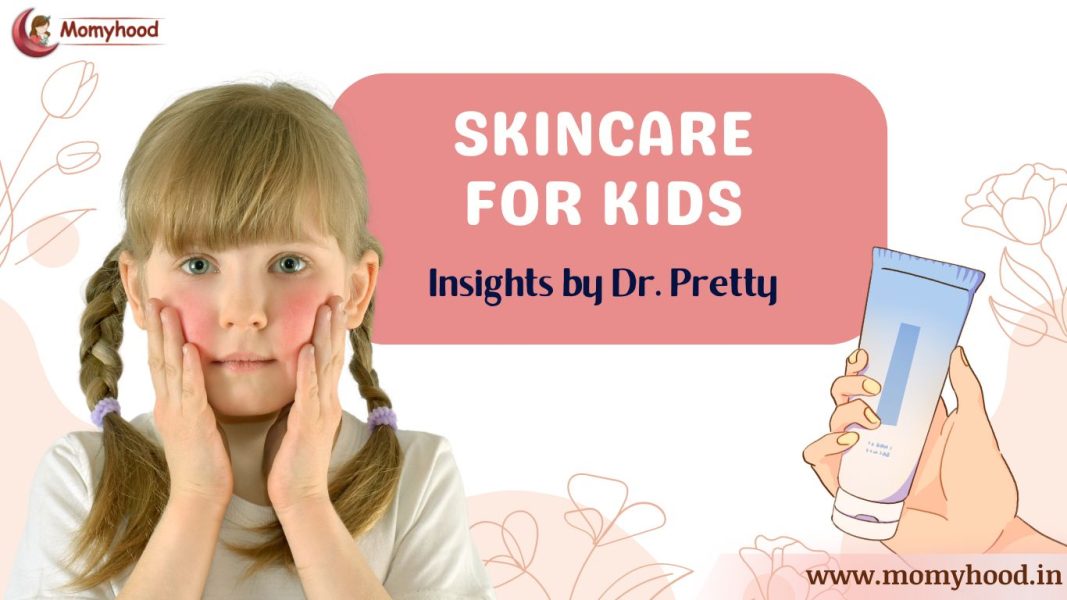Hi moms (and dads) of the wonderful world of Momyhood! Dr. Pretty here, a practicing dermatologist. Today, we’re diving into a topic that’s been catching my eye in the office: skincare for kids.
The shelves are overflowing with fancy products promising a youthful glow, even for the littlest ones. The message is clear: a number-of-step routine is the key to flawless skin, at any age. But hold on a second! Kids’ skincare needs are vastly different from adults.
Contents
- 1 Why Adult Skincare Doesn’t Belong on Little Faces?
- 2 The Hidden Culprits: Sneaky Irritants in “Kid-Friendly” Products
- 3 Keeping it Simple: The Golden Rule of Skincare for Kids
- 4 When to Seek Professional Help: The Role of a Pediatric Dermatologist
- 5 The Bottom Line: Prioritizing Health and Embracing Natural Beauty
Why Adult Skincare Doesn’t Belong on Little Faces?
Think of your child’s skin as a delicate ecosystem. It’s thinner, more absorbent, and constantly renewing itself at a much faster pace than adult skin. This makes it incredibly vulnerable to harsh chemicals and adult-strength formulas commonly found in skincare products.
These aggressive ingredients can disrupt the natural balance of a child’s skin, leading to a variety of problems:
- Irritation: Fragrances, dyes, and other harsh chemicals can cause redness, dryness, and itchiness.
- Dryness: Stripping away natural oils with harsh cleansers can leave your child’s skin feeling parched and uncomfortable.
- Burns: Products containing high concentrations of acids (like alpha hydroxy acids and retinoids) are simply too strong for young skin and can cause burns.
In my practice, I see a concerning rise in cases of contact dermatitis, eczema flare-ups, and even burns – all stemming from the use of inappropriate skincare for kids.
The real kicker? The long-term effects of these chemicals on a developing body are still unknown. Some ingredients might even disrupt hormones, which is a risk we definitely don’t want to take.
Also read: Expert Tips By Dr. Anchal For Managing Dry Eyes In Kids
The Hidden Culprits: Sneaky Irritants in “Kid-Friendly” Products
While some companies might market products specifically for children, it’s important to be a savvy reader of ingredient labels. Here are some hidden culprits that can irritate your child’s delicate skin, even if the product claims to be “gentle” or “tear-free”:
- Sulfates: These cleansing agents can be harsh and stripping, leaving your child’s skin dry and irritated.
- Alcohol: Look out for ingredients like SD alcohol or denatured alcohol, which can be drying and disrupt the natural balance of the skin.
- Essential Oils: While often touted for their natural properties, essential oils can be highly concentrated and irritating to a child’s sensitive skin. Opt for fragrance-free products whenever possible.
- Parabens: These preservatives have come under scrutiny for their potential endocrine-disrupting effects. While research is ongoing, it’s best to err on the side of caution for your child’s developing body. Check out this blog: The unmasking: How make up and skin care products impact children
By understanding these hidden irritants, you can make informed choices when selecting skincare for kids. Remember, “gentle” doesn’t always mean safe!
Keeping it Simple: The Golden Rule of Skincare for Kids
So, what’s the answer? The good news is, most children don’t need a complicated, multi-step skincare for kids routine. Here’s my golden rule: keep it simple and gentle.
- Gentle Cleansing: An ultra-gentle, fragrance-free cleanser is all you need to remove dirt and grime without stripping away natural oils.
- Basic Moisturizing: A basic, vitamin-enriched moisturizer will keep their skin soft, hydrated, and healthy.
That’s it! Skip the serums, scrubs, and anything else promising miracle results. These products are likely unnecessary and potentially harmful for your child’s delicate skin.
When to Seek Professional Help: The Role of a Pediatric Dermatologist
Now, if your child has a specific skin concern like acne or eczema, that’s a different story. Ditch the self-experimentation and consult a pediatric dermatologist.
We’re trained to treat children’s skin with the right approach, using safe and effective products specifically formulated for their unique needs.
The Bottom Line: Prioritizing Health and Embracing Natural Beauty
Moms, let’s prioritize our children’s health and well-being over chasing unrealistic beauty standards. Their beautiful, young skin deserves better than harsh chemicals and adult anxieties. Skincare for kids should be about protecting their precious skin and empowering them to embrace their natural beauty, just the way it is.
With a simple, gentle routine and the guidance of a pediatric dermatologist when needed, we can ensure their skin stays healthy and radiant throughout their childhood.
Lots of love,
Dr. Pretty
Your comments and shares do more than just support our blog—they uplift the amazing moms who share their stories here. Please scroll down to the end of the page to leave your thoughts, and use the buttons just below this line to share. Your support makes a big difference!




Woh I like your content, saved to favorites! .